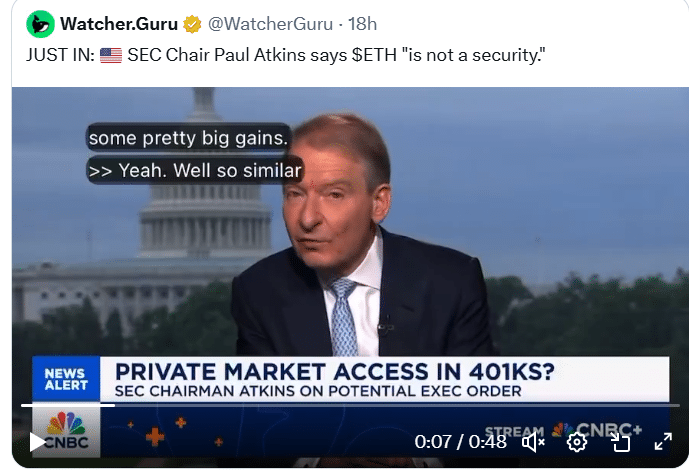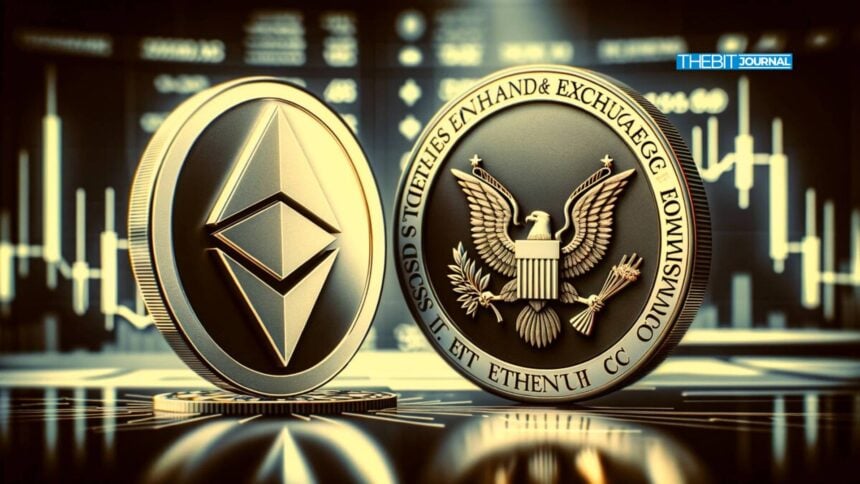SEC Chair Paul Atkins has announced that Ethereum not a security, igniting what many regard as the most crucial regulatory moment in crypto since Bitcoin’s categorization. In a live broadcast, Atkins clarified that Ether is not a security, similar to Bitcoin. This provides investors and developers with much-needed legal certainty.
Ethereum Not a Security: SEC Chair’s Statement Shocks the Industry
This clarification that Ethereum not a security occurs at a vital time. Institutional demand for ETH has soared. Corporate treasuries are amassing millions in ETH holdings, while ETF producers are rushing to bring Ethereum-linked financial products to market. The SEC’s decision lifts one of the remaining significant legal clouds over $ETH, establishing it as an institutionally viable, regulatory-safe digital asset.

Institutional Ethereum Surge Follows the SEC’s Clarity
The market’s reaction has been electric. Within hours after Atkins’ remark, ETH experienced a rise in trade, institutional flows drove net inflows beyond $520 million, and firms like as SharpLink Gaming increased their ETH holdings to almost 280,000 tokens. Analysts now regard Ethereum as a “reserve-grade” cryptocurrency, appropriate for treasury allocation and financial product backing.
According to financial researcher Michaël van de Poppe, “The confirmation that Ethereum not a security has triggered the kind of narrative shift that only happens once a cycle.” Investors increasingly regard ETH as more than just programmable money; it’s becoming regulatory infrastructure.
The transition of Ethereum from speculative token to approved asset class is based in this moment: the SEC has finally acknowledged that Ethereum not a security. It is more than simply relaxation; it is a green signal for full-throttle invention.
Ethereum’s Staking and Tokenization Future Looks Unstoppable
But the tale does not end with categorization. SEC Chair Atkins also hinted at potential regulatory allowances for Ethereum-powered technologies. He mentioned the ERC-3643 standard and an impending “innovation exemption” that might expand $ETH not-a-security classification to include tokenized securities and identity-based smart contracts.

“We’re exploring how programmable finance can fit into compliant frameworks,” Atkins informed the audience. This includes ETFs that support ETH staking, which was previously a murky legal area. Given that Ethereum not a security, staking might be included in regulated offers without concern of SEC punishment.
For builders and protocol developers, this is more than simply validation; it is rocket fuel. With lower compliance risk, the $ETH ecosystem may now experiment with tokenization, DeFi insurance, real-world asset protocols, and staking-as-a-service.
Ethereum Not a Security: Why This Matters for Every Crypto Investor
Whether you’re an ETH holder, DeFi trader, or crypto fund manager, the confirmation that Ethereum not a security is more than just news; it represents a fundamental shift. It opens up a slew of new financial products, enables US-regulated funds to accept ETH, and validates years of ecosystem work.
It also protects retail customers from uncertainty. If Ethereum had been categorized as a security, centralized exchanges may have delisted it or limited access to American users. The contrary is true: access is expanding, liquidity is increasing, and $ETH is currently the gold standard for legal clarity in cryptocurrency.
“This is the cleanest regulatory moment Ethereum has ever had,” one policy strategist stated. “Not only is Ethereum not a security. The SEC has finally accepted it.”
FAQs
Why is Ethereum not a security?
SEC Chair Paul Atkins confirmed that Ethereum, like Bitcoin, lacks the qualities that define a security, mainly centralization and profit expectation from a promoter.
Will this affect Ethereum staking products?
Yes, staking-related ETFs and protocols now have a clearer legal path since Ethereum is not a security.
Is this confirmation legally binding?
It’s not a formal statute yet, but Atkins’ public statement sends a powerful regulatory signal to markets, lawyers, and investors.
Can other tokens also get this status?
Possibly. Ethereum’s treatment sets a precedent, but every token will be reviewed individually.
Glossary
Ethereum Not a Security: A regulatory status meaning ETH is treated like a commodity, not governed under SEC securities law.
Tokenization: Digitizing real-world assets (like bonds or stocks) on a blockchain.
Staking ETF: A financial product that offers exposure to ETH staking rewards in a regulated format.
ERC-3643: Ethereum token standard for compliant, identity-based tokenization.
Innovation Exemption: A potential regulatory pathway allowing compliant Ethereum-based products to launch under lighter rules.





























